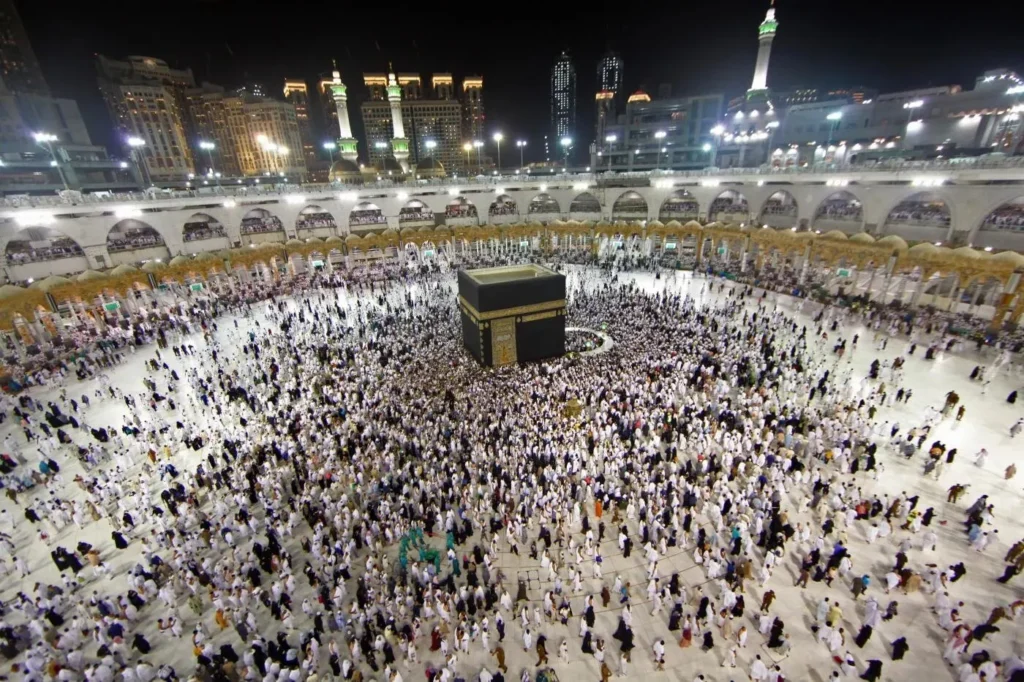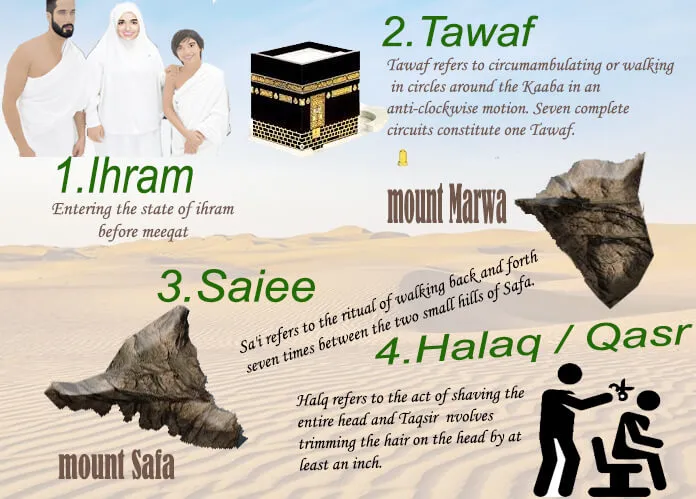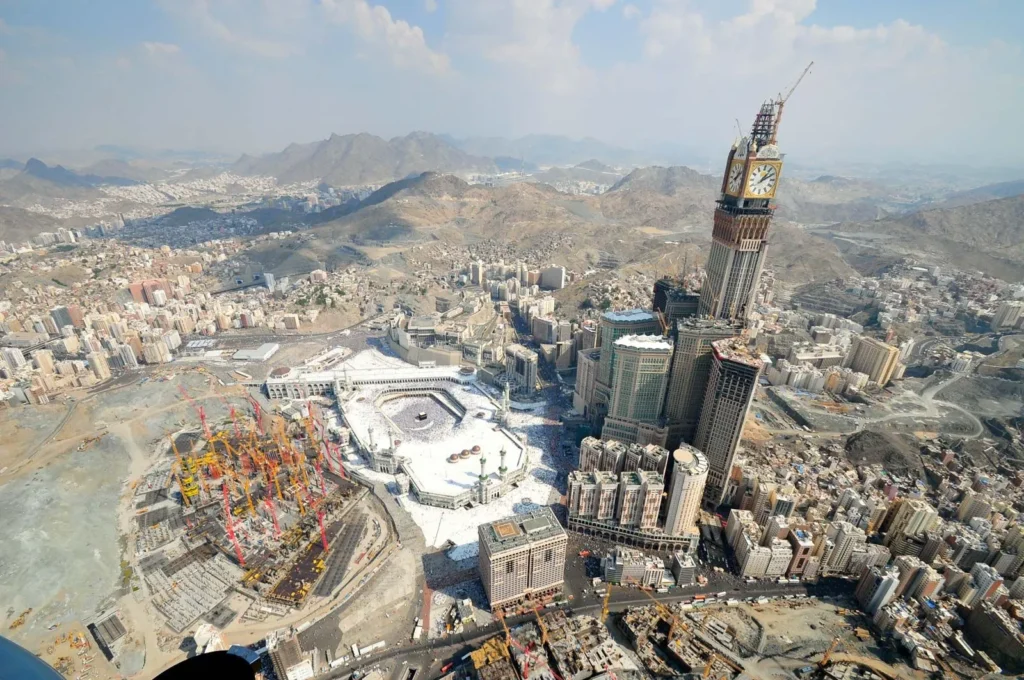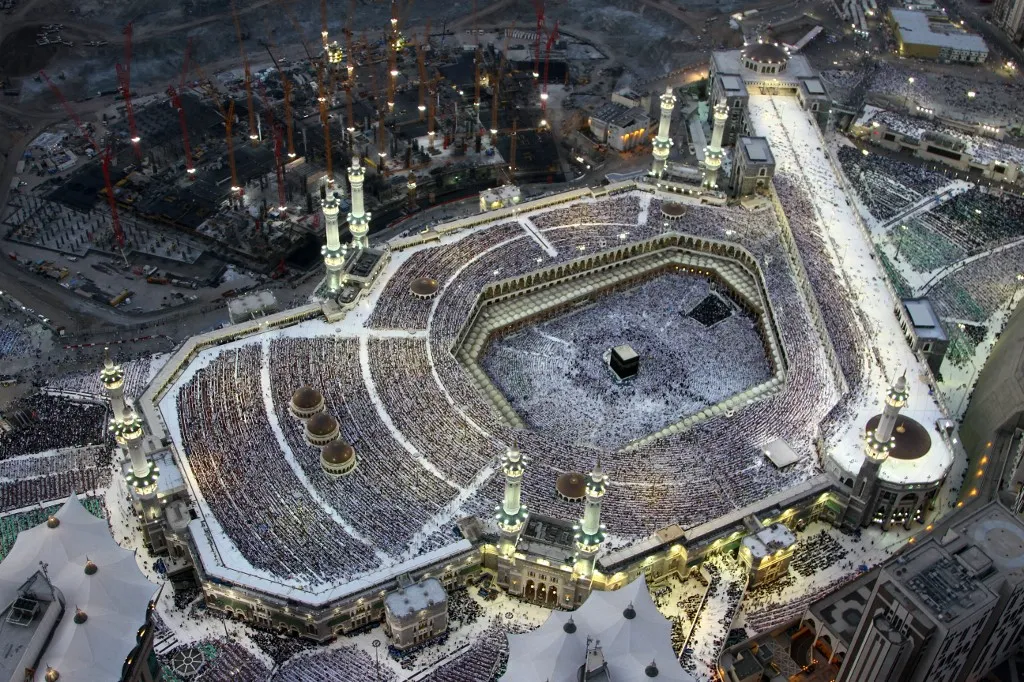Estimated reading time: 10 minutes
-
Detailed definition of Umrah.
-
The clear difference between Umrah and Hajj.
-
The main rituals of this pilgrimage.
-
The religious, cultural, and profound impact of Umrah on individuals and the community.
-
Guidance and important notes for those in Vietnam who wish to undertake this sacred pilgrimage.
- Detailed Definition: What is Umrah?
- The Rituals of Umrah
- The Religious and Cultural Significance of Umrah
- The Influence and Role of Umrah in the Muslim Community
- Registration Process and Notes for Umrah (for Vietnamese people)
- Conclusion: The Significance of Understanding What Umrah Is
Detailed Definition: What is Umrah?
To truly understand Umrah, we need to see it not just as a trip, but as a profound spiritual ritual. So, what is Umrah? It is defined as a minor pilgrimage for Muslims, performed at the holy city of Mecca, Saudi Arabia, and can be undertaken at any time of the year. This is a major difference from the greater Hajj pilgrimage, which is only performed during a specific period. The main purpose of Umrah is to purify the soul, seek forgiveness from Allah, and strengthen a deep connection with the Almighty.
The Concept of Umrah in Islam
In the broader context of Islam, Umrah is a voluntary but highly encouraged form of worship. It is not a mandatory duty like Hajj, but it brings immense blessings and spiritual significance. Performing Umrah helps believers cultivate humility, patience, and generosity, thereby strengthening their faith and achieving inner peace. It is an opportunity for each individual to renew themselves, abandon their mistakes, and move towards a more virtuous life.
Differentiating Umrah from Hajj
Although both Umrah and Hajj are pilgrimages to Mecca, they have core differences that Muslims need to understand clearly. Understanding this distinction helps us not only to differentiate between the two rituals but also to see the unique importance and role of each rite in the life of a Muslim.
| Criteria | Umrah (Minor Pilgrimage) | Hajj (Major Pilgrimage) |
|---|---|---|
| Obligation | Not obligatory, but highly encouraged. Can be performed multiple times in a lifetime. | It is one of the Five Pillars of Islam, obligatory at least once in a lifetime for those who are financially and physically able. |
| Time of Performance | Anytime during the year, except for the days of Hajj. | Only performed in the month of Dhul Hijjah (the last month of the Islamic calendar) annually. |
| Number & Complexity of Rituals | Simpler rituals, including Ihram, Tawaf, Sa’i, and Tahallul (hair cutting). | Includes more complex and longer rituals, with additional rites at Mina, Arafat, and Muzdalifah. |
| Duration of Pilgrimage | Usually takes only a few hours to one or two days to complete. | Lasts for about 5 to 6 days, or can extend up to 10 days depending on the schedule. |
This difference shows that Umrah is more flexible, allowing believers to seek purification and closeness to Allah more frequently.

History and Origin of Umrah
The history of Umrah and Hajj is linked to the story of the Kaaba, the Sacred House at the center of the Grand Mosque in Mecca. The Kaaba is believed to have been built by the prophets Ibrahim (Abraham) and his son Ismael under Allah’s command. From that time, the tradition of pilgrimage was maintained for centuries and was fully re-established during the time of Prophet Muhammad. Since then, Umrah has become an indispensable part of the spiritual life of the Muslim community, symbolizing piety and unity.
The Rituals of Umrah
Although simpler than Hajj, the rituals of Umrah still require thorough preparation and a high degree of concentration. There are four main steps that each pilgrim must perform to complete this sacred journey:
-
Ihram:
-
This is the first sacred state that a pilgrim must enter before reaching Mecca. Ihram requires physical and spiritual purity.
-
Men wear two seamless white cloths, one wrapped around the waist and one draped over the shoulder. Women wear modest clothing that covers the entire body, leaving only the face and hands exposed.
-
Upon entering Ihram, the pilgrim declares the niyyah (intention to perform Umrah) and abstains from all worldly prohibitions such as wearing makeup, perfume, cutting nails/hair, hunting, and sexual relations.
-
The symbolic meaning of Ihram is to erase all distinctions of social status, wealth, and gender, so that all believers are equal before Allah.
-
-
Tawaf:
-
After entering Ihram, the pilgrim proceeds to the Grand Mosque and performs Tawaf – walking around the Kaaba (the cubic shrine) seven times in a counter-clockwise direction.
-
Each circuit is performed with special prayers, expressing reverence and connection to the Almighty. This is one of the most emotionally powerful rituals.
-
-
Sa’i:
-
After Tawaf, the pilgrim continues to perform Sa’i – walking briskly or jogging seven times between the two small hills of Safa and Marwah, located near the Kaaba.
-
This ritual reenacts the journey of Hajar, the wife of Prophet Ibrahim, as she desperately searched for water for her son Ismael in the scorching desert. This act of walking/jogging is a reminder of perseverance and steadfast faith in Allah’s help.
-
-
Hair Cutting/Tahallul:
-
The final step to complete Umrah is Tahallul, or hair cutting.
-
Men can either shave their entire head or trim a portion of their hair. Shaving is considered superior.
-
Women only need to cut a small lock of hair.
-
This ritual symbolizes the end of the state of Ihram, purification, and a new beginning.

The rituals of Umrah
-
Conditions and Requirements for Performing Umrah:
To perform Umrah, pilgrims need to meet several important conditions:
-
To be a Muslim with strong faith.
-
To be of sound mind, and in good physical and mental health to complete the journey.
-
To have sufficient financial means to cover the journey without burdening oneself or one’s dependents.
-
To have all legal documents, such as a valid passport and a special Umrah visa issued by the Saudi Arabian authorities.
-
To strictly adhere to the entry and health regulations of Saudi Arabia, including necessary vaccination requirements.
-
Especially, during the state of Ihram, the pilgrim must strictly follow the rules of dress and behavior, avoiding the use of cosmetics, perfumes, or performing prohibited actions.
The Religious and Cultural Significance of Umrah
Umrah is not just a series of rituals, but also a profound experience with much religious and cultural significance, strongly impacting the spiritual life of believers and the community.
Spiritual and Religious Significance
Spiritually, Umrah offers a golden opportunity for Muslim believers to seek forgiveness from Allah for past sins. It is a journey of purification, renewing oneself, helping each person feel lighter and more peaceful. Many see it as a way to strengthen their personal relationship with the Almighty, expressing absolute reverence and obedience. The feeling of standing before the Kaaba, where millions of believers have stood before, brings an indescribable spiritual connection.
Personal Benefits and Moral Development
The journey of Umrah demands patience, sacrifice, and self-control. During the performance of the rituals, pilgrims cultivate precious virtues such as tolerance, perseverance, and humility. Leaving behind daily life, wearing simple attire, and focusing on the rituals helps them eliminate material distractions, directing their minds entirely towards religious purposes, thereby strengthening faith and inner peace.
Distinct Significance Compared to Hajj and Other Pilgrimages
As mentioned, Umrah is not obligatory and can be performed multiple times, which gives it a unique meaning. It allows believers to frequently “refresh” their souls, reconnecting with their faith without having to wait for the annual Hajj. Although the rituals are simpler, Umrah is no less profound in its inner meaning. It emphasizes the personal aspect of worship and the direct relationship with Allah, turning each trip into a private opportunity for purification and spiritual strengthening.
The Influence and Role of Umrah in the Muslim Community
Umrah does not stop at personal significance but also creates far-reaching impacts, contributing to shaping the Muslim community in many aspects.
Impact on Individuals, Families, and the Community
After completing Umrah, many pilgrims experience a significant positive change in their spirit and attitude towards life. They often become more compassionate, patient, and calm, bringing these high moral values back to their families and spreading them to the community. The trip also strengthens family bonds as members often perform the rituals together, creating shared sacred memories.
On a broader level, Umrah also has great significance in connecting the global Muslim community (Ummah). Millions of believers from all countries and cultures converge in Mecca, performing the same rituals, wearing the same attire, creating an extraordinary scene of unity and equality. This helps to strengthen the spirit of brotherhood, remove all geographical and social barriers, and affirm the unity of the Muslim community.
Economic and Social Impact
The continuous growth in the number of Umrah pilgrims annually has created a significant economic and social impact. The service, tourism, and transportation sectors of Saudi Arabia benefit greatly from this influx of visitors. Hotels, restaurants, travel agencies, and transportation services have all grown strongly to serve the needs of millions of believers. This not only generates enormous income for the Saudi Arabian economy but also promotes infrastructure development and creates jobs for thousands of people.
Additionally, countries with large Muslim communities also benefit from pilgrimage-related services such as providing Umrah tour packages, training tour guides, and other support services, contributing to local economic development. Umrah is truly an important economic driver, promoting trade and connection between Muslim countries.

Registration Process and Notes for Umrah (for Vietnamese people)
For Vietnamese people, registering for Umrah and preparing for the trip requires meticulousness and thorough research.
Basic Steps to Go for Umrah:
-
Register through a reputable travel agency: This is the most important step. Look for travel agencies in Vietnam that specialize in organizing Umrah tours, are fully licensed, and authorized by the Embassy of Saudi Arabia. They will assist you with the entire process, from visa to itinerary.
-
Prepare documents:
-
Valid Passport: Ensure it is valid for at least 6 months from the intended date of return.
-
Umrah Visa: The travel agency will help you complete this procedure. This is a special visa for pilgrimage purposes.
-
Health Certificate: Some vaccination requirements (such as for meningitis, flu) and a general health check-up may be required. Check for updated information from the embassy or travel agency.
-
-
Confirm finances and insurance: Ensure you have sufficient funds for the trip. Purchasing travel and health insurance is extremely necessary to prevent unexpected risks related to health or luggage.
-
Learn about customs and culture: Understand the local customs, culture, dress code (especially the Ihram attire), and proper conduct at the holy sites of Mecca and Medinah. This shows respect and helps you integrate better.
-
Study the ritual process: Although the travel agency will provide guidance, studying the rituals of Umrah (Ihram, Tawaf, Sa’i, Tahallul) in depth before the trip will help you perform them more confidently and meaningfully.
Common Mistakes and How to Avoid Them:
To avoid unnecessary problems during your Umrah pilgrimage, keep the following in mind:
-
Invalid documents: Always double-check your passport, visa, and related documents before departure. A small error could lead to you being denied entry.
-
Missing flights or getting separated from the group: Stay in contact with the group leader, follow the schedule, and arrive on time at meeting points to avoid missing flights or getting lost in crowded environments.
-
Violating Ihram regulations: Do not forget that many things are forbidden while in the state of Ihram. Using perfume, cosmetics, or shaving/cutting hair/nails incorrectly can invalidate your ritual. Study carefully or ask the group leader if you are unsure.
-
Not ensuring good health: The Umrah pilgrimage requires good health. Make sure you get enough rest, drink plenty of water, and eat properly. Avoid overexertion, especially on peak ritual days and in hot weather.
-
Not understanding the schedule clearly: Don’t hesitate to ask the group leader or guide about anything you are unclear about regarding the schedule or rituals. A clear understanding helps you be more proactive and at ease throughout the trip.
Conclusion: The Significance of Understanding What Umrah Is
Through this exploratory journey, we have clarified the question, What is Umrah? – a minor pilgrimage but one with incredibly deep spiritual meaning, playing an important role in the religious, cultural, and social life of Muslims worldwide. Umrah is not just a physical trip but also an inner journey, helping believers seek forgiveness, cleanse sins, and strengthen their connection with the Almighty.
Having a full awareness of Umrah, from its definition, history, and rituals to its profound meaning and impact, is extremely important. It helps each believer prepare thoroughly, both physically, spiritually, and legally, for a sacred journey, while also enhancing personal values and contributing positively to the community. Clearly understanding the significance of Umrah also helps non-Muslims have a more accurate and respectful view of one of Islam’s most important rituals.
If you are nurturing the dream of performing the Umrah pilgrimage, Nuhaira sincerely advises you to delve deeply into each ritual, prepare well in every aspect – from health, finances, and documents to your mental state. Most importantly, keep an open heart, respect the culture and traditions of the Holy City of Mecca, so that your trip becomes a truly meaningful, complete, and memorable experience in your life. It will surely be a journey that leaves an indelible mark on your soul!
See more:
Self-Guided Tour of Arabia: A-Z Detailed Guide

